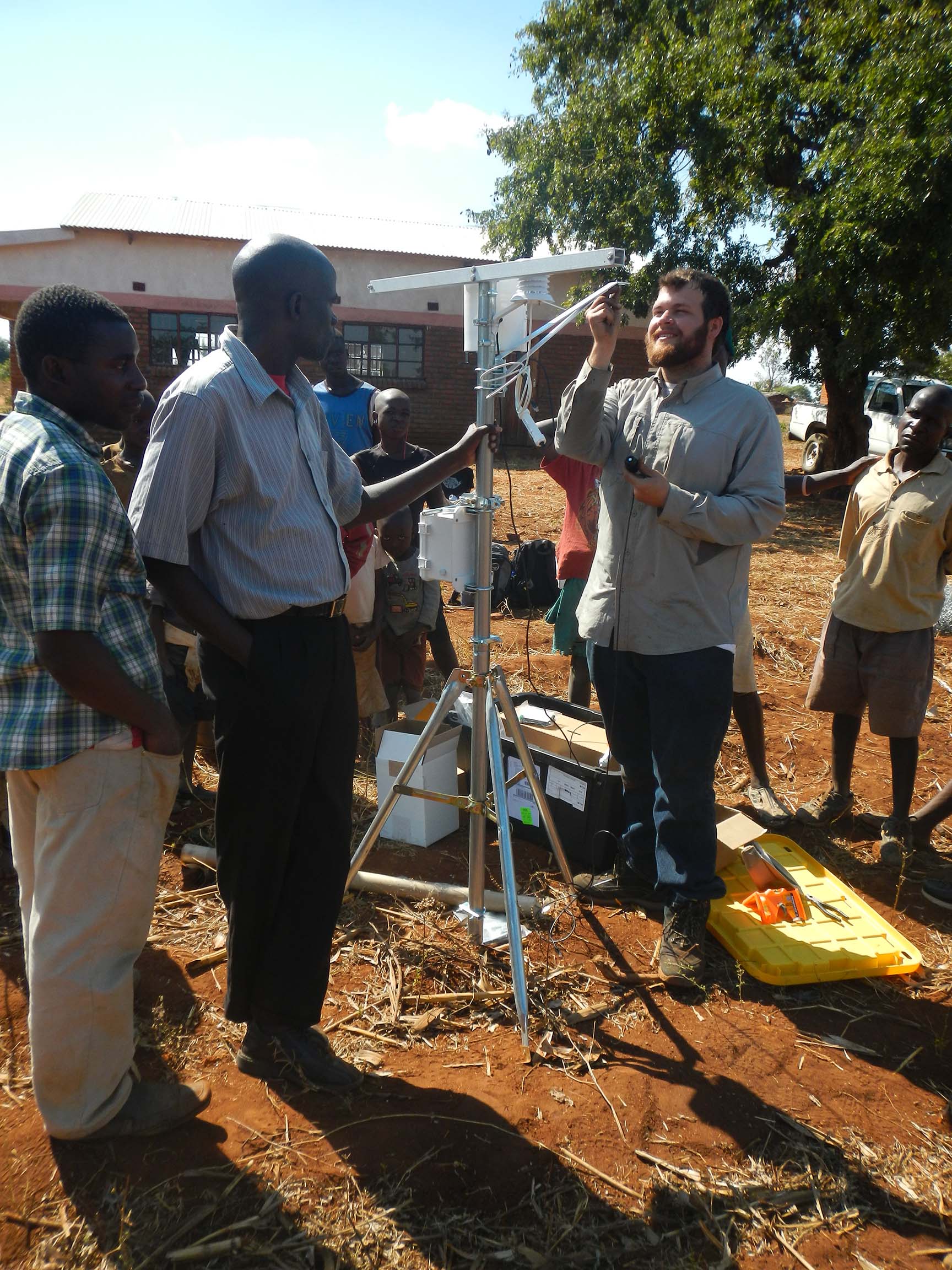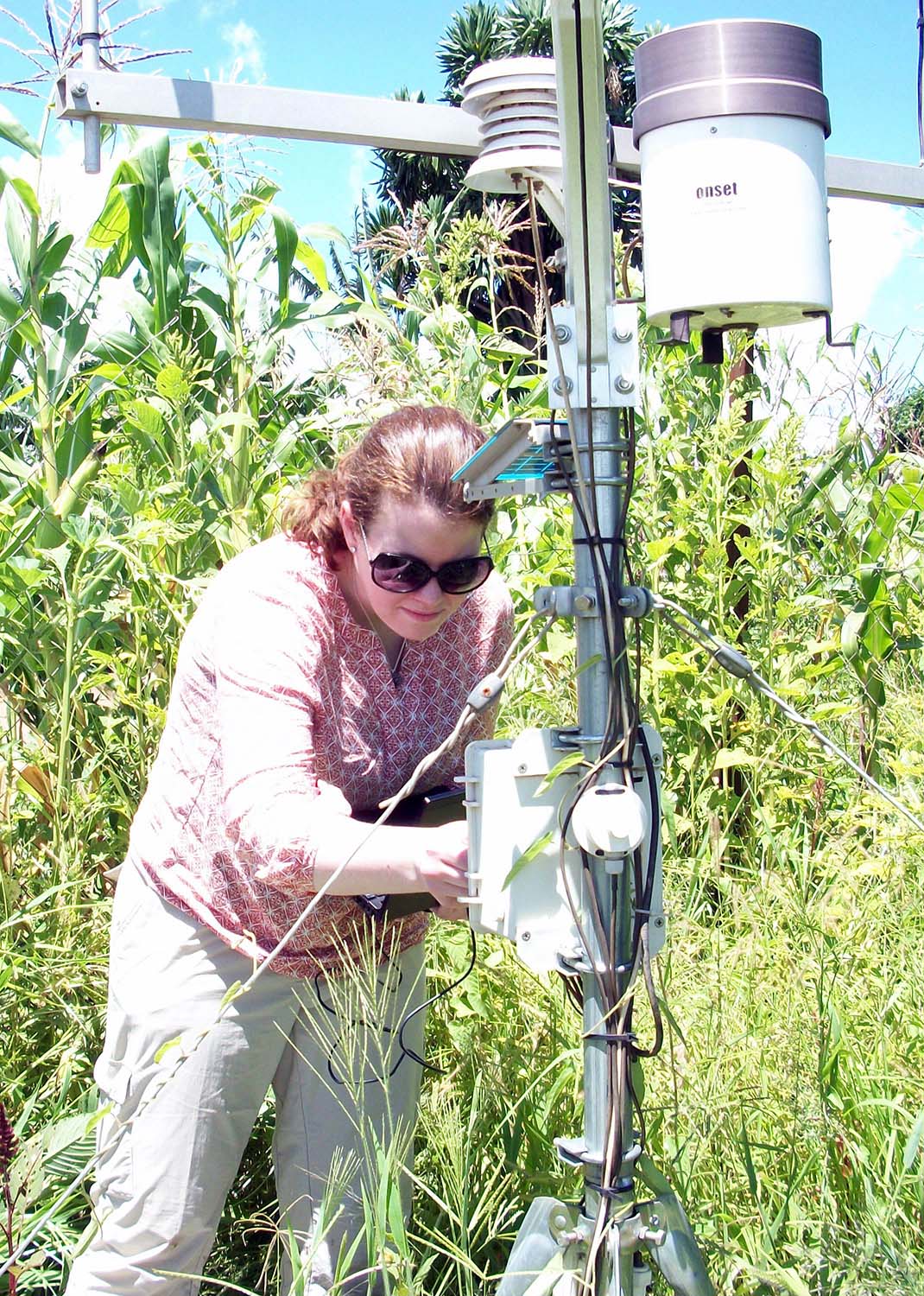Both of these GCFSI center-led projects are aimed at helping farmers and the agriculture industry reduce risk, improve yields, and guide future development of maize strains through the collection and analysis of precise weather data.
Project Team: Joseph P. Messina, Bradley P. Peter
 Much of Sub-Saharan Africa has experienced food shortages in the last several decades, prompting concern for the future of food security and the effects of a changing climate on agricultural systems. In Malawi, adverse weather and droughts have resulted in severe swings in agricultural output, particularly for smallholder farmers occupying sub-optimal agricultural regions. Marginal agricultural areas, regions with historically unpredictable and/or chronically low crop production are most sensitive to climatic changes. A primary objective of our research is to identify the locations of marginal agricultural land in Malawi by developing new methodology for characterizing agricultural productivity, and to provide insight into where development initiatives would prove most beneficial. Our team has visited Malawi to conduct land cover assessments in key regions spanning the entire country. Agricultural land has been assessed and interviews have been held with farmers and agricultural extension officers in order to inquire about crops grown, limiting factors for yield (biophysical or social), land-use history, and other geographic data. The data collected from these assessments are being used to validate agricultural productivity and marginal land models developed using remotely sensed products. In addition to field assessment, five weather stations have been constructed and installed at villages and research stations in Malawi that will be used primarily for relating growing season weather data with satellite imagery to monitor crop health and estimate yields.
Much of Sub-Saharan Africa has experienced food shortages in the last several decades, prompting concern for the future of food security and the effects of a changing climate on agricultural systems. In Malawi, adverse weather and droughts have resulted in severe swings in agricultural output, particularly for smallholder farmers occupying sub-optimal agricultural regions. Marginal agricultural areas, regions with historically unpredictable and/or chronically low crop production are most sensitive to climatic changes. A primary objective of our research is to identify the locations of marginal agricultural land in Malawi by developing new methodology for characterizing agricultural productivity, and to provide insight into where development initiatives would prove most beneficial. Our team has visited Malawi to conduct land cover assessments in key regions spanning the entire country. Agricultural land has been assessed and interviews have been held with farmers and agricultural extension officers in order to inquire about crops grown, limiting factors for yield (biophysical or social), land-use history, and other geographic data. The data collected from these assessments are being used to validate agricultural productivity and marginal land models developed using remotely sensed products. In addition to field assessment, five weather stations have been constructed and installed at villages and research stations in Malawi that will be used primarily for relating growing season weather data with satellite imagery to monitor crop health and estimate yields.
Project Team: Nathan J. Moore, Victoria W. Breeze, Nafiseh Haghtalab
 Another key problem is understanding how agricultural yield is changing due to climate shifts. The primary focus of this team's work is to measure changes in the start-of-season, which dictates planting time. Most maize varieties in Malawi would be affected negatively by a shorter rainy season, particularly in southern Malawi. Our team has gathered all weather station data and all gridded data sets of rainfall data to detect and estimate trends in start- and end-of-season. We also are working to expand the number of weather stations in Malawi to improve the value for gridded datasets by furnishing ground truth. Our results show which gridded datasets best match station data, and all of them indicate a foreshortening of the rainy season by as much as two weeks in certain areas compared to the 1980s. We are also looking for spatial correlates during droughts to help in predicting drought risk.
Another key problem is understanding how agricultural yield is changing due to climate shifts. The primary focus of this team's work is to measure changes in the start-of-season, which dictates planting time. Most maize varieties in Malawi would be affected negatively by a shorter rainy season, particularly in southern Malawi. Our team has gathered all weather station data and all gridded data sets of rainfall data to detect and estimate trends in start- and end-of-season. We also are working to expand the number of weather stations in Malawi to improve the value for gridded datasets by furnishing ground truth. Our results show which gridded datasets best match station data, and all of them indicate a foreshortening of the rainy season by as much as two weeks in certain areas compared to the 1980s. We are also looking for spatial correlates during droughts to help in predicting drought risk.
Both of these projects are aimed at helping farmers and the agriculture industry reduce risk, improve yields, and guide future development of maize strains (likely toward fast-maturing varieties). Key partners are Malawi Ministry of Agriculture, LUANAR, and the Malawi Met Office.